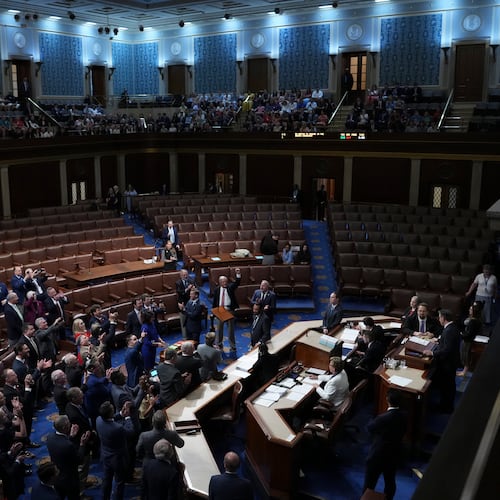Few leaders agreed with Georgia Gov. Brian Kemp’s refusal to issue a shelter-in-place order for Georgia.
The business and medical communities urged it. Local governments took matters into their own hands.
Finally, he acted; Georgians now join the ranks of the majority of Americans who will be sheltering in place. And we have to hope that the governor acted in time.
Georgia’s grim statistics grow alarmingly day-by-day – on Wednesday the state reported 4,748 confirmed cases of COVID-19 and 154 deaths. One week ago, the state had 1,643 cases and 56 deaths.
Republican governors around the nation had started to issue strict orders, even though fighting the pandemic somehow and unnecessarily took on partisan shading.
New projections on the disease’s spread in Georgia and from President Donald Trump’s coronavirus task force were “game-changing,” Kemp said at a press conference on Wednesday.
Dr. Kathleen Toomey, the head of Georgia’s public health department who joined Kemp, said the new models showed a higher rate of “community transmission” that leads to higher rates of infection.
And so Kemp’s position became untenable.
He will issue a shelter-in-place order today (Thursday). It will be in place from Friday through April 13. He will cancel K-12 schools through the rest of the academic year.
Doctors, nurses, first responders, grocery store workers and many others certainly appreciate the governor’s delayed move to stop the spread of this virus. They are on the front lines and will keep working and risking exposure on our behalf. At least the state has finally taken concrete action to show some concern for their selflessness.
Local hospitals have been preparing for a spike in patients, something that will be a big challenge.
Healthcare executives and state officials are frantically working to find — or create — space for more beds and ICU units, while securing more ventilators, masks, gowns and other crucial equipment and supplies.
They also must find more doctors and nurses to staff overflow hospitals, medics to transport patients and people to backfill for healthcare workers who become infected.
Kemp indicated that new information had come to light and changed his mind, but alarming projections from experts have been around for some time, and that’s why healthcare leaders have been acting.
At his press conference Kemp said he was informed of new data that this virus “is now transmitting before people see signs.”
“Those individuals could have been infecting people before they ever felt that,” he said of the symptoms. “We didn’t know that until the last 24 hours.”
That reasoning is specious.
Health officials had expressed concern that the virus could be transmitted this way.
Kemp will have to live with these facts: He was slow to act in a state where the statistics on this pandemic are among the worst in the nation; his delayed action almost certainly means things will be worse than they might have been in Georgia.
The governor earlier shut down bars, banned many gatherings, canceled public school through late April and urged the “medically fragile” and others vulnerable to the disease to stay at home.
He repeatedly urged citizens to follow the guidance from disease experts, but until now refused to use some of the considerable power he’d been given by the Georgia General Assembly. Those powers are in place until April 13. At that point, they could be extended.
It didn’t help that the governor’s staff sent a confusing message on Saturday.
A top aide upbraided local governments for “overreacting” to the coronavirus outbreak by enacting tougher restrictions on movement and commerce than those called for by the governor.
Chief of staff Tim Fleming seemed to be indicating that saving lives somehow wasn’t worth the economic devastation caused by shutting down the state.
Local leaders were blindsided by the criticism from Kemp’s chief of staff, and Fleming undermined the governor’s repeated statements urging citizens to follow expert advice.
And worse, it fed the idea that some in Kemp’s administration weren’t taking this pandemic seriously enough and contributing to his lack of action.
There’s plenty to cause concern.
On Tuesday, the White House released new projections that there could be 100,000 to 240,000 deaths in the country from the pandemic — even if current social distancing guidelines are maintained. Officials said that the number could be less if people change their behavior.
When we urged the governor to issue such an order last week, we compared Georgia’s statistics to those of Ohio.
It’s impossible to draw direct comparisons among states, given geographic and population density differences. And, of course, the vagaries of this disease are not well understood.
But it’s worth noting that Ohio, a state with about a million more people than Georgia, has a governor who acted early and decisively.
Ohio Gov. Mike DeWine issued his shelter-in-place order on March 22, close to two weeks before Georgia’s will take effect.
Ohio has 2,547 cases of COVID-19 and 65 deaths. As noted above, Georgia has close to twice as many confirmed cases and more than twice as many deaths.
Experts have made sobering predictions about how bad things could get for Georgia when the crisis reaches a peak. Finally, Gov. Kemp has acted to try and improve those dire predictions. Let’s hope that his actions haven’t come too late.
-- The Editorial Board
About the Author
Keep Reading
The Latest
Featured





